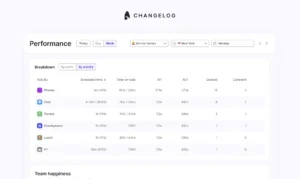
Strategising customer support for winter peak season: a Wolf & Badger webinar recap

Overview
Our recent webinar with Maja from Wolf & Badger offered an in-depth exploration into preparing customer support teams for the demanding winter peak season. The session highlighted the criticality of this period, which spans from Black Friday to Christmas, in the retail and e-commerce landscape.
Wolf & Badger’s approach to peak season planning
Wolf & Badger’s strategy for the peak season is anchored around three key pillars: people, tools, and processes. These pillars not only form the foundation of their peak season strategy, but also resonate with their core business values of innovation, execution, and fairness. This alignment ensures that every aspect of their customer support is infused with these guiding principles, fostering a harmonious and effective operational environment.
Operational strategies and challenges
Collaborative forecasting and planning
- Financial forecasting: partnering with the finance team for predictions on customer interaction volumes.
- Continuous improvement: analysing post-peak performance to inform improvements in processes and technology for the subsequent year.
Staffing and training for excellence
- Strategic staffing: evaluating the need for temporary agents or outsourcing to accommodate peak season demands.
- Emphasis on training: Maja highlighted the importance of comprehensive training. Wolf & Badger extensively use Slack for communication and employ 1:1 shadowing sessions via Zoom to ensure each team member is fully equipped to represent the brand’s values and operational standards.
Tactical focus on the three pillars
People: building a committed team
- Utilising internal referrals: leveraging internal referrals ensures a dedicated and efficient service during peak times, as team members are more likely to be engaged and motivated when they have been referred by their peers
- Offering full-time opportunities: high-performing temporary workers are offered permanent roles, fostering a sense of stability within the team
- Balancing operational needs with team well-being: during the intense period between Black Friday and Christmas, Wolf & Badger makes best efforts in striking a balance between operational efficiency and the well-being of their team. Recognising the importance of rest and recuperation, they allow all team members to take up to two consecutive days off. This approach not only ensures that staff are well-rested and more effective, but also helps in maintaining high morale during this demanding period. Additionally, to enhance service continuity and reduce the time needed for new agents to familiarise themselves with ongoing issues, they allow tickets to remain with the same agent. This strategy not only speeds up response times for new tickets but also ensures a fair distribution of holiday rights across the team during peak season.
Tools: enhancing operational agility
- Transitioning from spreadsheets to Surfboard, Wolf & Badger has significantly enhanced their ability to create tailored shift plans for the upcoming Black Friday and peak season. This move has been pivotal in managing diverse shift patterns, enabling the team to solidify long-term planning without disrupting existing shift patterns during normal operations.
- The flexibility of Surfboard allows for strategic foresight in scaling up staffing during peak periods, effectively coordinating the necessary number of channels and team members. This advanced planning, achievable weeks ahead with Surfboard, is crucial for maintaining operational efficiency. Furthermore, Surfboard has proven invaluable in facilitating the planning for both temporary staff and extended service hours, ensuring that the customer support team is optimally equipped to handle the increased demands of the peak season.
Processes: customer-centric approach
- Facilitating self-service: implementing technologies to assist customers in accessing key information, reducing the need for direct interactions.
Maja’s advice for Workforce Managers
In her parting advice, Maja emphasised the importance of early planning and team happiness for a successful peak season.
“Make sure you plan early, and keep your team happy” she advised.
Highlighting the importance of regular check-ins with the team, Maja highlighted the need to equip them with the necessary tools to deliver exceptional service. She reminded us that the heart of customer service lies with the people who deliver it:
“Without people, you can’t do customer service.”
This simple yet profound statement from Maja captures the essence of effective workforce management – the harmony of advanced planning, team well-being, and equipping staff with the right tools and support.



